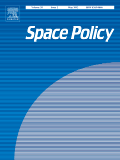
SPACE POLICY
metrics 2024
Exploring the Frontiers of Governance in Space.
Introduction
SPACE POLICY is a premier academic journal published by Elsevier Science Ltd that focuses on the interdisciplinary field of space policy, exploring the myriad issues that arise in the governance and strategic use of space resources. With an ISSN of 0265-9646 and an E-ISSN of 1879-338X, this journal addresses critical topics pertinent to economics, law, sociology, and political science, making it an essential resource for researchers, policymakers, and academicians. Since its inception in 1985 and continuing through to 2024, SPACE POLICY has garnered strong recognition, achieving Q1 and Q2 rankings in various categories as of 2023, indicating its significant impact in both theoretical and applied research. Although it operates on a subscription basis, the journal's commitment to delivering high-quality, rigorous research ensures it remains at the forefront of discourse on the socio-political implications of space exploration and utilization. Whether you are a seasoned researcher or a student delving into the complexities of space governance, SPACE POLICY provides a vital platform for advancing knowledge and debate in this rapidly evolving field.
Metrics 2024
 0.67
0.67 2.00
2.00 2.10
2.10 29
29Metrics History
Rank 2024
Scopus
IF (Web Of Science)
JCI (Web Of Science)
Quartile History
Similar Journals

Advances in Astronomy and Space Physics
Illuminating the Universe Through Rigorous Inquiry.Advances in Astronomy and Space Physics is an esteemed journal dedicated to the exploration and dissemination of research in the expansive fields of astronomy and space science. Published by Taras Shevchenko National University of Kyiv, this journal provides a platform for researchers, professionals, and students to share groundbreaking studies and innovations. With an ISSN of 2227-1481, it covers a wide range of subjects including astrophysics, planetary sciences, and space exploration technologies, thereby fostering interdisciplinary collaboration. Although not an Open Access journal, it maintains a commitment to high-quality, peer-reviewed content that contributes significantly to the advancement of scientific knowledge. The journal's mission is to promote sustainable practices in space research while also exploring the implications of discoveries on Earth and beyond. By maintaining rigorous publication standards, Advances in Astronomy and Space Physics aims to serve as a critical resource for those involved in the ever-evolving study of our universe.

CEAS Space Journal
Transforming aerospace innovation through scholarly excellence.CEAS Space Journal, published by SPRINGER WIEN, serves as a critical platform for advancing knowledge in the fields of aerospace engineering and space science. With an ISSN of 1868-2502 and an E-ISSN of 1868-2510, this journal has been at the forefront of scholarly communication since its inception in 2011, showcasing cutting-edge research that spans to the present day (2024). The journal holds a solid reputation, ranking in the Q2 quartile for Aerospace Engineering and Q3 for Space and Planetary Science as of 2023, illustrating its impactful contributions within these disciplines. Scopus rankings further underline its prominence, placing it in the 70th percentile among aerospace engineering journals. Although it is not an open access publication, the insights published in the CEAS Space Journal are invaluable for researchers, professionals, and students alike, providing essential studies and reviews that push the boundaries of aerospace innovation and planetary exploration. The journal's commitment to quality and rigor makes it an indispensable resource for anyone looking to deepen their understanding of contemporary challenges and technological advancements in space science.
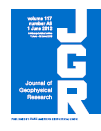
JOURNAL OF GEOPHYSICAL RESEARCH-SPACE PHYSICS
Bridging Disciplines for a Deeper Understanding of Space PhysicsJOURNAL OF GEOPHYSICAL RESEARCH-SPACE PHYSICS, published by the American Geophysical Union, stands as a pivotal academic platform dedicated to the dissemination of cutting-edge research in the fields of geophysics and space physics. With an impressive impact factor and recognition as a Q1 journal in Geophysics and Q2 in Space and Planetary Science as of 2023, this journal offers an esteemed venue for researchers seeking to publish high-quality studies that advance our understanding of the interactions between the Earth and space environment. The journal features comprehensive coverage of topics spanning from the ionosphere to magnetosphere, facilitating insights critical for both academic and applied sciences. Researchers, professionals, and students will find that this journal not only presents rigorous peer-reviewed articles but also encourages the accessibility of scientific knowledge, enhancing collaboration across disciplines. With its dedicated readership and influence in the scientific community, JOURNAL OF GEOPHYSICAL RESEARCH-SPACE PHYSICS plays an essential role in fostering innovations within these dynamic fields.
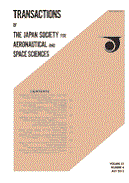
TRANSACTIONS OF THE JAPAN SOCIETY FOR AERONAUTICAL AND SPACE SCIENCES
Connecting Ideas, Inspiring Innovations in AerospaceTRANSACTIONS OF THE JAPAN SOCIETY FOR AERONAUTICAL AND SPACE SCIENCES is a distinguished journal published by the Japan Society for Aeronautical and Space Sciences, focusing on the latest advancements and research in the fields of aerospace engineering and space and planetary science. With a broad range covering theoretical studies, practical applications, and experimental research, this journal serves as a vital platform for researchers, professionals, and students keen to explore the intricacies of aeronautics and space technologies. Although currently closed to open access, the journal maintains a significant presence in the academic community, boasting a 2023 Scopus ranking of Q3 in both of its respective fields and offering insights that contribute to ongoing discussions and innovations in aerospace. Since its inception in 1969 and with publications extending to 2024, the journal not only reflects the evolving landscape of aeronautics and space sciences but also encourages discourse that paves the way for future breakthroughs. For your engagement and contributions to this dynamic field, the TRANSACTIONS OF THE JAPAN SOCIETY FOR AERONAUTICAL AND SPACE SCIENCES stands as an essential resource.

SOLAR SYSTEM RESEARCH
Fostering Innovation in Space and Planetary ScienceSOLAR SYSTEM RESEARCH, published by Pleides Publishing Inc, offers a comprehensive platform for the exploration and dissemination of scientific knowledge in the fields of Astronomy, Astrophysics, and Space and Planetary Science. With its origins tracing back to 1969, this journal provides a vital resource for researchers and professionals seeking to deepen their understanding of the solar system's complexities, including planetary formation, extraterrestrial geology, and the dynamics of celestial bodies. Although categorized in the Q4 quartile for both relevant disciplines, SOLAR SYSTEM RESEARCH remains committed to publishing high-quality research that contributes to advancing contemporary scientific discourse. Dedicated to fostering collaboration and innovation, the journal is indexed in Scopus and adheres to rigorous academic standards, making it an essential resource for students and professionals alike pursuing the latest developments in solar system studies.

Space Science and Technology-Kosmicna Nauka i Tehnologia
Fostering collaboration in aerospace engineering and planetary science.Space Science and Technology-Kosmicna Nauka i Tehnologia is an esteemed journal dedicated to advancing knowledge in the fields of Aerospace Engineering and Space and Planetary Science. Published by the well-regarded PUBLISHING HOUSE AKADEMPERIODYKA in Ukraine, this journal serves as a vital platform for researchers, professionals, and students to share groundbreaking findings and innovative technologies related to space exploration and engineering techniques. Since its establishment in 2019, Space Science and Technology has contributed significantly to the academic discourse in its category, currently holding a Q4 quartile ranking in both Aerospace Engineering and Space and Planetary Science as of 2023. Although it does not offer open-access publication, its listed ISSN (1561-8889) and E-ISSN (2518-1459) ensure wide accessibility to its published content. As the journal continues its journey from 2019 to 2024, it strives to enhance its impact and H-index while fostering collaboration and knowledge dissemination across the global space science community.
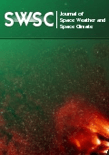
Journal of Space Weather and Space Climate
Unlocking Mysteries: The Intersection of Space Weather and Climate ChangeThe Journal of Space Weather and Space Climate is a premier, internationally recognized open-access journal published by EDP Sciences S A, dedicated to advancing the understanding of the intricate interactions between solar and geophysical phenomena. With an ISSN of 2115-7251, this journal has been at the forefront of research since 2011, fostering discussions and disseminating findings related to atmospheric and planetary sciences. The journal ranks in the top quartile for both Atmospheric Science and Space and Planetary Science, highlighting its critical role in the academia with Scopus rankings placing it at #24 out of 104 in Space and Planetary Science and #35 out of 148 in Atmospheric Science. Based in France, it offers seamless access to cutting-edge research, motivating researchers, professionals, and students to contribute to the growing knowledge in this vital field. The journal's commitment to open access ensures that impactful research reaches an extensive audience, promoting collaborative efforts to tackle issues related to space weather and climate change.

International Journal of Aviation Aeronautics and Aerospace
Pioneering Insights in Aerospace Engineering and TechnologyInternational Journal of Aviation Aeronautics and Aerospace, published by Embry-Riddle Aeronautical University, serves as a pivotal platform for the dissemination of innovative research in the fields of aerospace engineering, civil and structural engineering, and safety, risk, reliability, and quality. With an ISSN of 2374-6793 and designated as an open access journal since 2014, it enables unhindered global access to its scholarly content, fostering collaboration among researchers, professionals, and students in the aviation sector. The journal's presence spans from 2014 to 2024 and is recognized within the Q3 category across multiple engineering domains according to recent metrics. Despite its emerging status, it holds respectable rankings in Scopus, demonstrating its relevance and contribution to the academic community, particularly in dynamic engineering sectors. It is an essential resource for anyone looking to enhance their understanding of advancements and challenges in aviation and aerospace solutions.

International Journal of Aeronautical and Space Sciences
Unveiling Solutions for Aerospace ChallengesThe International Journal of Aeronautical and Space Sciences, published by Springer, is a prominent platform dedicated to advancing research and innovation in the fields of Aerospace Engineering, Control and Systems Engineering, Electrical and Electronic Engineering, and Materials Science. With an ISSN of 2093-274X and an E-ISSN of 2093-2480, the journal has established itself as a vital resource since its inception in 2011, currently offering insights that span a wide range of contemporary challenges and technological advancements in aeronautics and space exploration. Ranking in the Q2 category across multiple disciplines, including Aerospace and Control Engineering, signifies its recognized impact and quality within the academic community. Although not an open-access journal, it remains accessible to researchers, professionals, and students seeking to enhance their understanding of complex aerospace systems and their applications. The journal’s commitment to publishing high-quality research makes it indispensable for those aiming to contribute to, or stay informed about, the evolving landscape of aerospace technology.
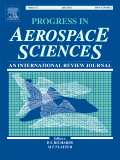
PROGRESS IN AEROSPACE SCIENCES
Advancing aerospace innovation through rigorous research.PROGRESS IN AEROSPACE SCIENCES is a prestigious journal published by PERGAMON-ELSEVIER SCIENCE LTD, recognized as a leading platform in the field of aerospace engineering, mechanical engineering, and mechanics of materials. With an impressive history dating back to 1961, the journal covers a wide spectrum of topics pivotal to advancing aerospace technology and innovation. Its recent ranking as Q1 in multiple engineering categories underscores its significance, ranking #1 in Aerospace Engineering and placing within the top 20 percentile in both Mechanical Engineering and Mechanics of Materials, according to Scopus assessments. Researchers, professionals, and students looking to engage with high-impact research will find PROGRESS IN AEROSPACE SCIENCES an invaluable resource, offering insights into cutting-edge developments and methodologies. Although it does not operate under an open-access model, the journal upholds rigorous peer-review standards, ensuring that the published content meets the highest academic integrity. Situated in the United Kingdom, it plays a critical role in fostering international collaboration and knowledge-sharing in the aerospace sector.